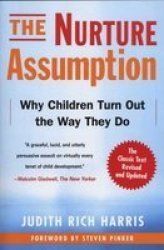Description
The book "The Nurture Assumption: Why Children Turn Out the Way They Do, Revised and Updated" by Judith Rich Harris is a 10-year-old book that argues that parents have little impact on their children's development. The book is updated with new information and has a fresh introduction by Harris. Harris discusses how and why the tendency of children to take cues from their peers works to their evolutionary advantage. She argues that nurture (parental) vs. nurture (peer group) is the strongest environmental influence on personality development. Harris' ideas are so thought-provoking, challenging, and potentially controversial that anyone concerned with parenting issues will find the book refreshing, important, and possibly life-changing.
This groundbreaking book, a Pulitzer Prize finalist and
New York Times notable pick, rattled the psychological establishment when it was first published in 1998 by claiming that parents have little impact on their children's development. In this tenth anniversary edition of
The Nurture Assumption, Judith Harris has updated material throughout and provided a fresh introduction. Combining insights from psychology, sociology, anthropology, primatology, and evolutionary biology, she explains how and why the tendency of children to take cues from their peers works to their evolutionary advantage. This electrifying book explodes many of our unquestioned beliefs about children and parents and gives us a radically new view of childhood.
Whether it's musical talent, criminal tendencies, or fashion sense, we humans want to know why we have it or why we don't. What makes us the way we are? Maybe it's in our genes, maybe it's how we were raised, maybe it's a little of both--in any case, Mom and Dad usually receive both the credit and the blame. But not so fast, says developmental psychology writer Judith Rich Harris. While it has been shown that genetics is only partly responsible for behavior, it is also true, Harris asserts, that parents play a very minor role in mental and emotional development.
The Nurture Assumption explores the mountain of evidence pointing away from parents and toward peer groups as the strongest environmental influence on personality development. Rather than leaping into the nature vs. nurture fray, Harris instead posits nurture (parental) vs. nurture (peer group), and in her view your kid's friends win, hands down. This idea, difficult as it may be to accept, is supported by the countless studies Harris cites in her breezy, charming prose. She is upset about the blame laid on parents of troubled children and has much to say (mostly negative) about "professional parental advice-givers." Her own advice may be summarized as "guide your child's peer-group choices wisely," but the aim of the book is less to offer guidance than to tear off cultural blinders. Harris's ideas are so thought-provoking, challenging, and potentially controversial that anyone concerned with parenting issues will find
The Nurture Assumption refreshing, important, and possibly life-changing.
--Rob Lightner
